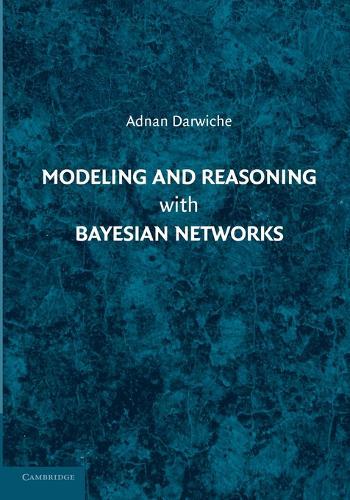Overview
This book is a thorough introduction to the formal foundations and practical applications of Bayesian networks. It provides an extensive discussion of techniques for building Bayesian networks that model real-world situations, including techniques for synthesizing models from design, learning models from data, and debugging models using sensitivity analysis. It also treats exact and approximate inference algorithms at both theoretical and practical levels. The treatment of exact algorithms covers the main inference paradigms based on elimination and conditioning and includes advanced methods for compiling Bayesian networks, time-space tradeoffs, and exploiting local structure of massively connected networks. The treatment of approximate algorithms covers the main inference paradigms based on sampling and optimization and includes influential algorithms such as importance sampling, MCMC, and belief propagation. The author assumes very little background on the covered subjects, supplying in-depth discussions for theoretically inclined readers and enough practical details to provide an algorithmic cookbook for the system developer.
Full Product Details
Author: Adnan Darwiche (University of California, Los Angeles)
Publisher: Cambridge University Press
Imprint: Cambridge University Press
Dimensions:
Width: 17.80cm
, Height: 2.90cm
, Length: 25.40cm
Weight: 0.960kg
ISBN: 9781107678422
ISBN 10: 1107678420
Pages: 562
Publication Date: 07 August 2014
Audience:
Professional and scholarly
,
Professional and scholarly
,
Professional & Vocational
,
Professional & Vocational
Format: Paperback
Publisher's Status: Active
Availability: Manufactured on demand

We will order this item for you from a manufactured on demand supplier.
Reviews
'... both practical and advanced ... The first five chapters are sufficient for students and practitioners to gain the necessary knowledge in order to build Bayesian networks for moderately sized applications with the aid of a software tool ... All major inference methods are covered in later chapters which allow researchers and software developers to implement their own software systems tailored to their needs ... It is a comprehensive book that can be used for self study by students and newcomers to the field or as a companion for courses on probabilistic reasoning. Experienced researchers may also find deeper information on some topics. In my opinion, the book should definitely be [on] the bookshelf of everyone who teaches Bayesian networks and builds probabilistic reasoning agents.' Artificial Intelligence '[This] book will make an excellent textbook; it covers topics suitable for both undergraduate and graduate courses. It will also help practitioners get a firm grasp of the fundamentals of modeling and inference with BNs, as well as some recent advances.' ACM Computing Reviews Bayesian networks are as important to AI and machine learning as Boolean circuits are to computer science. Adnan Darwiche is a leading expert in this area and this book provides a superb introduction to both theory and practice, with much useful material not found elsewhere. Stuart Russell, University of California, Berkeley Bayesian networks have revolutionized AI. This book gives a clear and insightful overview of what we have learnt in 25 years of research, by one of the leading researchers. It is both accessible and deep, making it essential reading for both beginning students and advanced researchers. David Poole, Professor of Computer Science University of British Columbia Bayesian Networks are models for representing and using probabilistic knowledge, introduced in the field of Artificial Intelligence by Judea Pearl back in the 1980's. Since then many inference methods, learning algorithms, and applications of Bayesian Networks have been developed, tested, and deployed, making Bayesian Networks into a solid and established framework for reasoning with uncertain information. Adnan Darwiche, a leading researcher in the field, has produced a book that provides a clear, coherent, and advanced introduction to Bayesian Networks that will appeal to students, practitioners, and scientists alike. A wonderful exposition that starts with propositional logic and probability calculus, and ends with state-of-the-art inference methods and learning algorithms. In my view, the best book on Bayesian Networks since Pearl's seminal book. Hector Geffner, ICREA and Universitat Pompeu Fabra The book is both practical and advanced... The book should definitely be in the bookshelf of everyone who teaches Bayesian networks and builds probabilistic reasoning agents. Yang Xiang, Artificial Intelligence ... a comprehensive presentation... Dorota Kurowicka, Mathematical Reviews The book is clearly written. In all, the clarity, continuity, and depth of the presentation mean that this would make a first class course text, as well as serving as a very useful reference work. I shall certainly recommend it for teaching purposes, and doubtless refer to it to remind myself about particular aspects of such models. David J. Hand, International Statistical Review This is an elegant and well-written book. The book provides an accessible walkthrough and formal treatment of BNs grounded in propositional logic. The book will make an excellent textbook; it covers topics suitable for both undergraduate and graduate courses. It will also help practitioners get a firm grasp of the fundamentals of modeling and inference with BNs, as well as some recent advances. Yousri ElFattah, Computing Reviews
'... both practical and advanced ... The first five chapters are sufficient for students and practitioners to gain the necessary knowledge in order to build Bayesian networks for moderately sized applications with the aid of a software tool ... All major inference methods are covered in later chapters which allow researchers and software developers to implement their own software systems tailored to their needs ... It is a comprehensive book that can be used for self study by students and newcomers to the field or as a companion for courses on probabilistic reasoning. Experienced researchers may also find deeper information on some topics. In my opinion, the book should definitely be [on] the bookshelf of everyone who teaches Bayesian networks and builds probabilistic reasoning agents.' Artificial Intelligence '[This] book will make an excellent textbook; it covers topics suitable for both undergraduate and graduate courses. It will also help practitioners get a firm grasp of the fundamentals of modeling and inference with BNs, as well as some recent advances.' ACM Computing Reviews
Author Information
Adnan Darwiche is a Professor in the Department of Computer Science at the University of California, Los Angeles.




